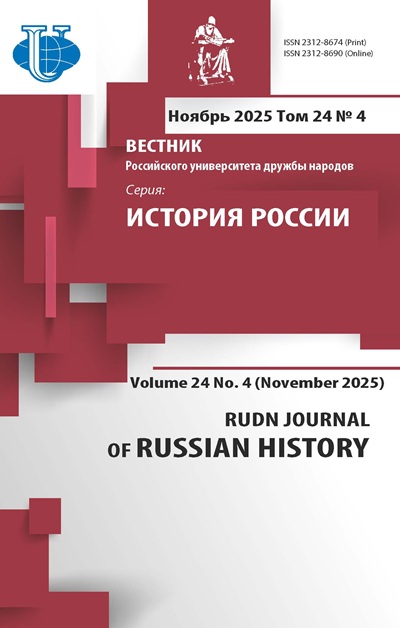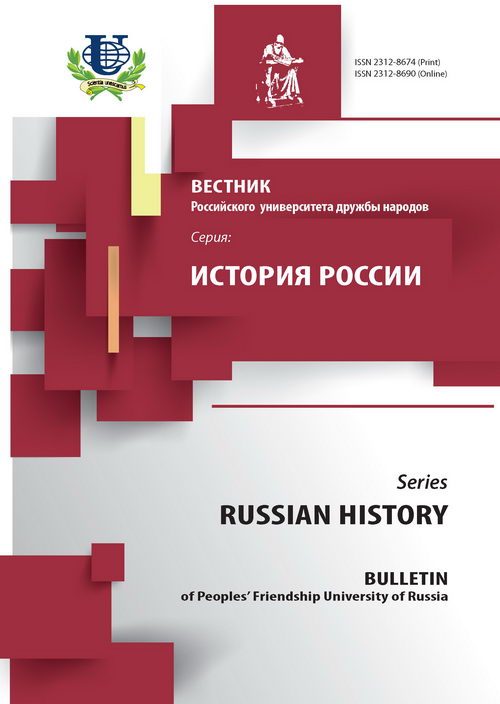№ 4 (2015)
- Год: 2015
- Статей: 19
- URL: https://journals.rudn.ru/russian-history/issue/view/255
СТАТЬИ
СМЕШАННЫЕ БРАКИ В ТАТАРСКОМ МУСУЛЬМАНСКОМ ОБЩЕСТВЕ НА РУБЕЖЕ ХIХ-ХХ ВВ.
Аннотация
В статье анализируются исторические особенности распространения межэтнических браков среди татар. Они были обусловлены процессами перехода от традиционного уклада к модернизированному образу жизни, переменами в системе ценностей. В начале XX в. данный вопрос рассматривался в качестве одной из социальных проблем и активно обсуждался на страницах национальной прессы, поднимался в художественных произведениях. Смешанные браки стали результатом кризиса семьи в самой мусульманской общине.
Вестник Российского университета дружбы народов. Серия: История России. 2015;(4):7-15
 7-15
7-15


НАРОДНЫЙ КРЕДИТ И БЛАГОТВОРИТЕЛЬНОСТЬ НА СТРАНИЦАХ ГАЗЕТЫ «РУССКИЕ ВЕДОМОСТИ» 1870-Х ГГ.
Аннотация
В статье анализируется идейная программа независимой внепартийной газеты «Русские ведомости». В лице своих редакторов Н. Скворцова, В. Соболевского, либеральной профессуры газета пропагандировала ценности социальной ответственности в политике. В вопросах развития народного кредита и благотворительности наиболее ярко проявился либерально-демократический характер идейной платформы издания. Как и народнические публицисты, издатели газеты были обеспокоены тяжелым материальным положением крестьянства. Газета активно поднимала тему социальной благотворительности и помощи.
Вестник Российского университета дружбы народов. Серия: История России. 2015;(4):16-23
 16-23
16-23


КОМАНДОВАНИЯ ФРОНТОВ ЗИМОЙ 1917 Г. В БОРЬБЕ С КРИЗИСОМ ПРОДОВОЛЬСТВЕННОГО СНАБЖЕНИЯ ДЕЙСТВУЮЩЕЙ АРМИИ
Аннотация
В статье рассматривается политика действий фронтовых командований периода Первой мировой войны в отношении продовольственного кризиса зимы 1917 г. В условиях кризиса снабжения военные власти самостоятельно вели борьбу по его преодолению и насыщению армии предметами тылового обеспечения. Общими усилиями Ставка Верховного Главнокомандования и штабы фронтов сумели предпринять ряд мер, которые позволили не допустить голода в армии накануне и в ходе Февральской революции.
Вестник Российского университета дружбы народов. Серия: История России. 2015;(4):24-33
 24-33
24-33


ЛОЗУНГИ В ПОЛИТИЧЕСКОМ ЯЗЫКЕ РАННЕГО СОВЕТСКОГО ОБЩЕСТВА (ПО ПИСЬМАМ В РЕДАКЦИЮ «РАБОЧЕЙ ГАЗЕТЫ» 1924-1925 ГГ.)
Аннотация
В данной статье рассматривается проникновение политических лозунгов в массы под влиянием пропаганды и агитации со стороны власти и органов печати в условиях НЭПа. Анализ данного вопроса позволяет понять механизм обратной связи в диалоге «власть-общество» на примере того, как массы воспринимали новые языковые константы и перемены, которые им предлагала власть.
Вестник Российского университета дружбы народов. Серия: История России. 2015;(4):34-44
 34-44
34-44


ДЕЯТЕЛЬНОСТЬ КАТОЛИЧЕСКИХ МИССИЙ ПО ОКАЗАНИЮ ПОМОЩИ ПЕРЕМЕЩЕННЫМ ЛИЦАМ В ПОСЛЕВОЕННЫЙ ПЕРИОД
Аннотация
В статье рассматривается деятельность католических миссий и организаций по оказанию помощи перемещенным лицам в послевоенный период. Выявляются особенности организации помощи русским беженцам в лагерях ДиПи, а также в процессе переселения их в другие страны, рассматривается вопрос влияния католических священников на русских перемещенных лиц и их вклад в развитие Русского зарубежья.
Вестник Российского университета дружбы народов. Серия: История России. 2015;(4):45-54
 45-54
45-54


ВЗГЛЯДЫ КИТАЙСКИХ УЧЕНЫХ НА ВНЕШНЮЮ ПОЛИТИКУ ЕКАТЕРИНЫ II
Аннотация
В статье рассматриваются взгляды китайских ученых на внешнюю политику Екатерины II. Определяется круг источников, послуживших документальной основой исследований российско-китайских отношений второй половины ХVIII в. Особое внимание уделяется тем изменениям, которые произошли в китайской историографии истории России времен Екатерины II на современном этапе ее развития.
Вестник Российского университета дружбы народов. Серия: История России. 2015;(4):55-62
 55-62
55-62


АНАЛИЗ ТАКТИКИ БОЕВЫХ ДЕЙСТВИЙ А.В. СУВОРОВА В ПРУССИИ И ПОЛЬШЕ (1761-1771 ГГ.)
Аннотация
Статья посвящена тактическим действиям А.В. Суворова в период накопления им первого боевого опыта на полях сражений в Пруссии и Польше в 1761-1777 гг. Автор выявляет основные элементы в его поведении как полководца, которые Суворов проявлял уже в начале своей карьеры и которые в итоге станут той уникальной, присущей только Суворову манерой поведения в бою.
Вестник Российского университета дружбы народов. Серия: История России. 2015;(4):63-69
 63-69
63-69


ИСТОРИЧЕСКИЙ ОПЫТ РАЗВИТИЯ РОССИЙСКО-КАЗАХСТАНСКОГО ГЕОЭНЕРГЕТИЧЕСКОГО КОМПЛЕКСА
Аннотация
В статье анализируются перспективные направления Российской Федерации и Республики Казахстан в сфере развития топливно-энергетического комплекса. Авторы на конкретных примерах прослеживают реализацию принятых совместных документов, направленных на активизацию сотрудничества двух стран в области разведки и добычи газа и нефти в последние десять лет. Особое внимание в статье уделяется российско-казахстанскому сотрудничеству а области атомной энергетики, поставок нефти и нефтепродуктов. Эти направления исследуются на примере крупнейших предприятий топливно-энергетических комплексов России и Казахстана.
Вестник Российского университета дружбы народов. Серия: История России. 2015;(4):70-78
 70-78
70-78


СОТРУДНИЧЕСТВО РОССИИ И ПАКИСТАНА В БОРЬБЕ С НАРКОУГРОЗОЙ НА СОВРЕМЕННОМ ЭТАПЕ
Аннотация
В статье автор анализирует сотрудничество России и Пакистана в борьбе с наркоугрозой, которая приобрела огромные масштабы и представляет собой глобальную угрозу не только здоровью населения России, но и национальной безопасности страны. Федеральная служба РФ по контролю за оборотом наркотиков (ФСКН) активно выстраивает международное сотрудничество в борьбе с наркоугрозой со странами Центрально-Азиатского региона, в том числе с Пакистаном. В статье проанализированы основные форматы и направления взаимодействия компетентных антинароктических структур России и Пакистана, отмечена роль в борьбе с наркоугрозой таких региональных организаций, как ШОС, ОДКБ, «Совет Россия - НАТО». Автор выделяет наиболее перспективные направления сотрудничества и отмечает, что российско-пакистанское взаимодействие в этой сфере не только отвечает интересам двух стран, но и способствует укреплению региональной и международной безопасности в целом.
Вестник Российского университета дружбы народов. Серия: История России. 2015;(4):79-85
 79-85
79-85


СТАНОВЛЕНИЕ И РАЗВИТИЕ «РУССКОГО СТИЛЯ» В АРХИТЕКТУРЕ РОССИЙСКОЙ ИМПЕРИИ XIX В.
Аннотация
Статья посвящена анализу генезиса и эволюции «русского стиля» в архитектуре Российской империи XIX в. Архитектура рассматривается как средство выражения идеи уникальности и самобытности культуры русского народа. Автор доказывает историческую обусловленность и выявляет социально-политическую нагрузку стилеобразования архитектуры самодержавной России.
Вестник Российского университета дружбы народов. Серия: История России. 2015;(4):86-95
 86-95
86-95


АКТУАЛЬНЫЕ ВОПРОСЫ ОБЩЕСТВЕННО-ПОЛИТИЧЕСКОЙ ДЕЯТЕЛЬНОСТИ АДЫГСКОЙ ИНТЕЛЛИГЕНЦИИ В КОНЦЕ ХIХ - НАЧАЛЕ ХХ В. В УСЛОВИЯХ ВХОЖДЕНИЯ СЕВЕРНОГО КАВКАЗА В СОСТАВ РОССИЙСКОЙ ИМПЕРИИ
Аннотация
В статье выявляются направленность, содержание и формы общественно-политической деятельности национальной интеллигенции в условиях трансформации системы общественных связей адыгского народа, связанной с включение Северного Кавказа в состав Российской империи с целью определения роли национальной интеллигенции в процессе инкорпорации региона в российское геополитическое пространство. Делается вывод о том, что хотя основным содержанием общественной деятельности национальной интеллигенции было повышение гражданского и политического статуса адыгского народа в системе российского государства, она играла объективно позитивную роль во «вписании» Северного Кавказа в российское социально-политическое пространство.
Вестник Российского университета дружбы народов. Серия: История России. 2015;(4):96-107
 96-107
96-107


РУССКИЙ ЗАГРАНИЧНЫЙ ИСТОРИЧЕСКИЙ АРХИВ В ПРАГЕ: ИСТОРИЯ СТАНОВЛЕНИЯ И ДЕЯТЕЛЬНОСТИ
Аннотация
На основе документов Русского заграничного исторического архива (РЗИА), хранящихся в Славянской библиотеке (г. Прага), в статье исследуется история становления, деятельности и повседневной жизни самого крупного архивного учреждения послереволюционной эмиграции. Освещается борьба политических группировок за право осуществлять руководство по формированию и сохранению документальной основы истории эмиграции, исследуются межличностные взаимоотношения и социальные практики сотрудников архива, не только его руководителей, но и рядовых, «незамечательных» людей, что позволяет восполнить лакуны в истории РЗИА.
Вестник Российского университета дружбы народов. Серия: История России. 2015;(4):108-119
 108-119
108-119


ПРОПАГАНДА БЕЗ ПРАВИЛ, ИЛИ ИНФОРМАЦИОННОЕ ПРОТИВОСТОЯНИЕ В УСЛОВИЯХ «ХОЛОДНОЙ ВОЙНЫ»
Аннотация
В статье анализируются особенности идеологической борьбы СССР и Запада в послевоенный период (1947-1991 гг.), использования открытых и скрытых методов воздействия, новых технических средств и информационных институций. Особое внимание уделяется пропагандистскому сопровождению войн во Вьетнаме и Афганистане, конфликтам между НАТО и Организацией Варшавского договора, различным формам конструирования позитивного и негативного образов стран, использования санкций и подрыва пацифистского движения.
Вестник Российского университета дружбы народов. Серия: История России. 2015;(4):120-129
 120-129
120-129


ТЕНДЕНЦИИ МУЗЫКАЛЬНОЙ ЖИЗНИ РОССИИ В НАЧАЛЕ ХХ В.
Аннотация
В статье исследуются основные направления русской музыкальной культуры Российской империи конца XIX - начала XX вв. В ее истории это было временем появления новых веяний и течений далеко не всегда соответствующих классическим академическим канонам музыкального творчества. В работе анализируются предпосылки новых форм музыки, таких как народные хоры, народные оркестры и др. В результате музыкальные жанры обогащаются и становятся понятными широкой аудитории слушателей. Одновременно, как показано в статье, меняется контингент студентов высших и средних учебных музыкальных заведений, что, к сожалению, повлекло за собой политизацию музыкального творчества, что было связано с общим политическим подъемом российского общества в этот сложный исторический период.
Вестник Российского университета дружбы народов. Серия: История России. 2015;(4):130-136
 130-136
130-136


РОЛЬ ОБЩИНЫ НИКОЛЬСКОГО ХРАМА НА МАРОСЕЙКЕ В ДУХОВНОЙ ЖИЗНИ МОСКВЫ XX В.
Аннотация
В статье рассматривается история становления и развития общины московского храма святителя Николая в Кленниках в Москве. Проведенный анализ позволил выявить духовные корни и связи прихода, его характерные особенности, главная из которых заключалась в том, что он не был разрушен после закрытия храма и отъятия пастырей, что являлось уникальной ситуацией тех лет не только для Москвы, но и всей Русской Православной Церкви.
Вестник Российского университета дружбы народов. Серия: История России. 2015;(4):137-145
 137-145
137-145


«И УЧАЛ ГОСУДАРЬ ЦАРЬ РЫДАТИ И ПЛАКАТИ...» (К ВОПРОСУ ОБ УБИЙСТВЕ ИВАНОМ ГРОЗНЫМ СВОЕГО СЫНА ИВАНА 16 НОЯБРЯ 1581 Г.)
Аннотация
В статье рассматривается вопрос о причинах гибели царевича Ивана, сына царя Ивана Грозного, рассматриваются источники и историография проблемы. Проведенный анализ позволил установить, что часто раздающиеся сегодня призывы пересмотреть данный сюжет с целью «облагораживания» облика Ивана Грозного не имеют под собой исторических оснований. Основной вывод статьи - царевич Иван трагически погиб от руки своего отца, что явилось глубоким потрясением для Ивана Грозного и ускорило его кончину.
Вестник Российского университета дружбы народов. Серия: История России. 2015;(4):146-154
 146-154
146-154


ФАЛЬСИФИКАЦИЯ ИСТОРИЧЕСКОЙ ПРАВДЫ В ГОД 70-ЛЕТИЯ ВЕЛИКОЙ ПОБЕДЫ
Вестник Российского университета дружбы народов. Серия: История России. 2015;(4):155-163
 155-163
155-163


АЛЕКСАНДР М. МАРТИН. ПРОСВЕЩЕННАЯ СТОЛИЦА: СОЗДАНИЕ ИМПЕРСКОЙ МОСКВЫ, 1762-1855. (ОКСФОРД: ИЗДАНИЕ ОКСФОРДСКОГО УНИВЕРСИТЕТА, 2013, 344 С.)
Вестник Российского университета дружбы народов. Серия: История России. 2015;(4):164-167
 164-167
164-167


НАШИ АВТОРЫ
Вестник Российского университета дружбы народов. Серия: История России. 2015;(4):168-171
 168-171
168-171
















